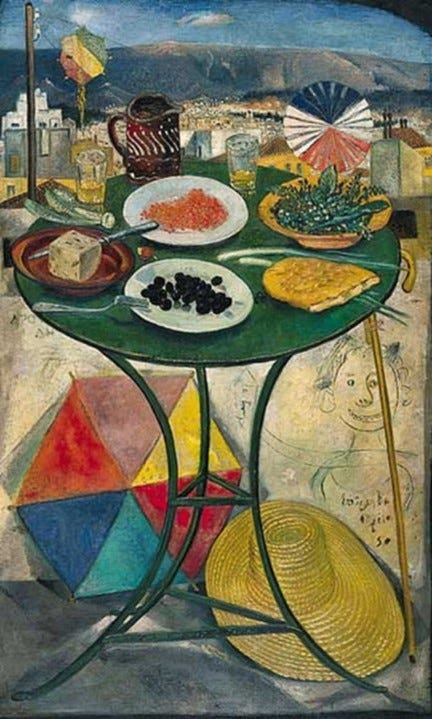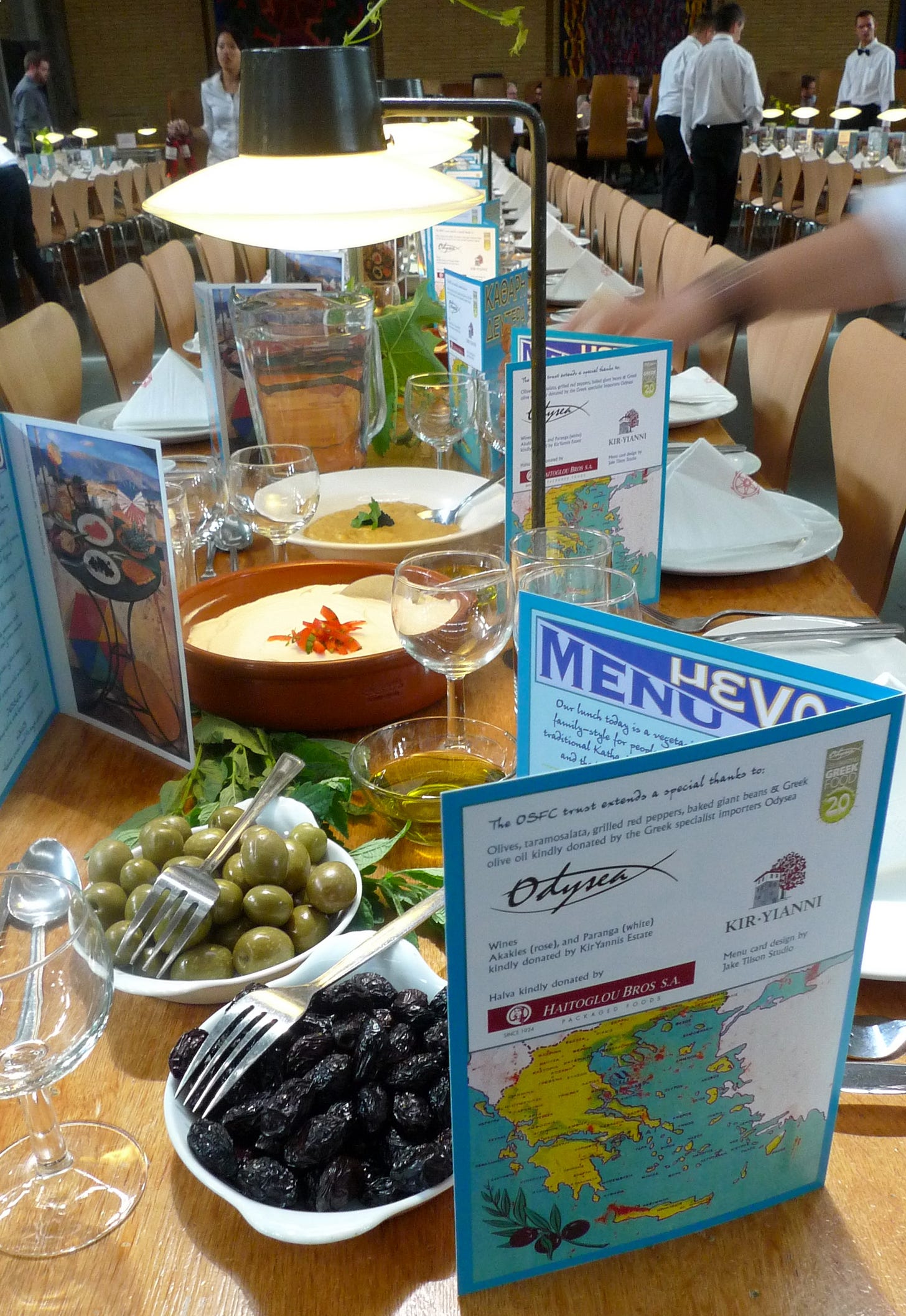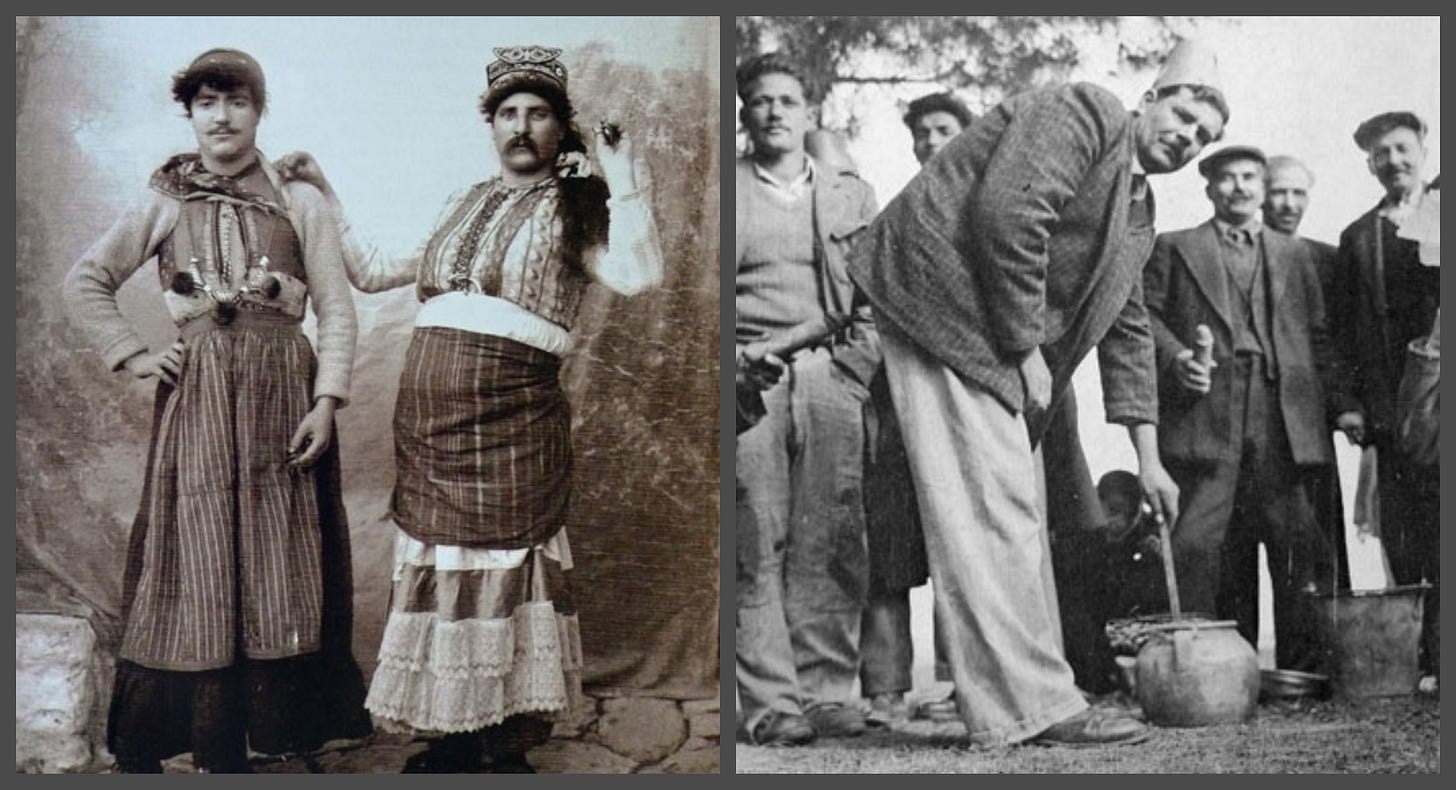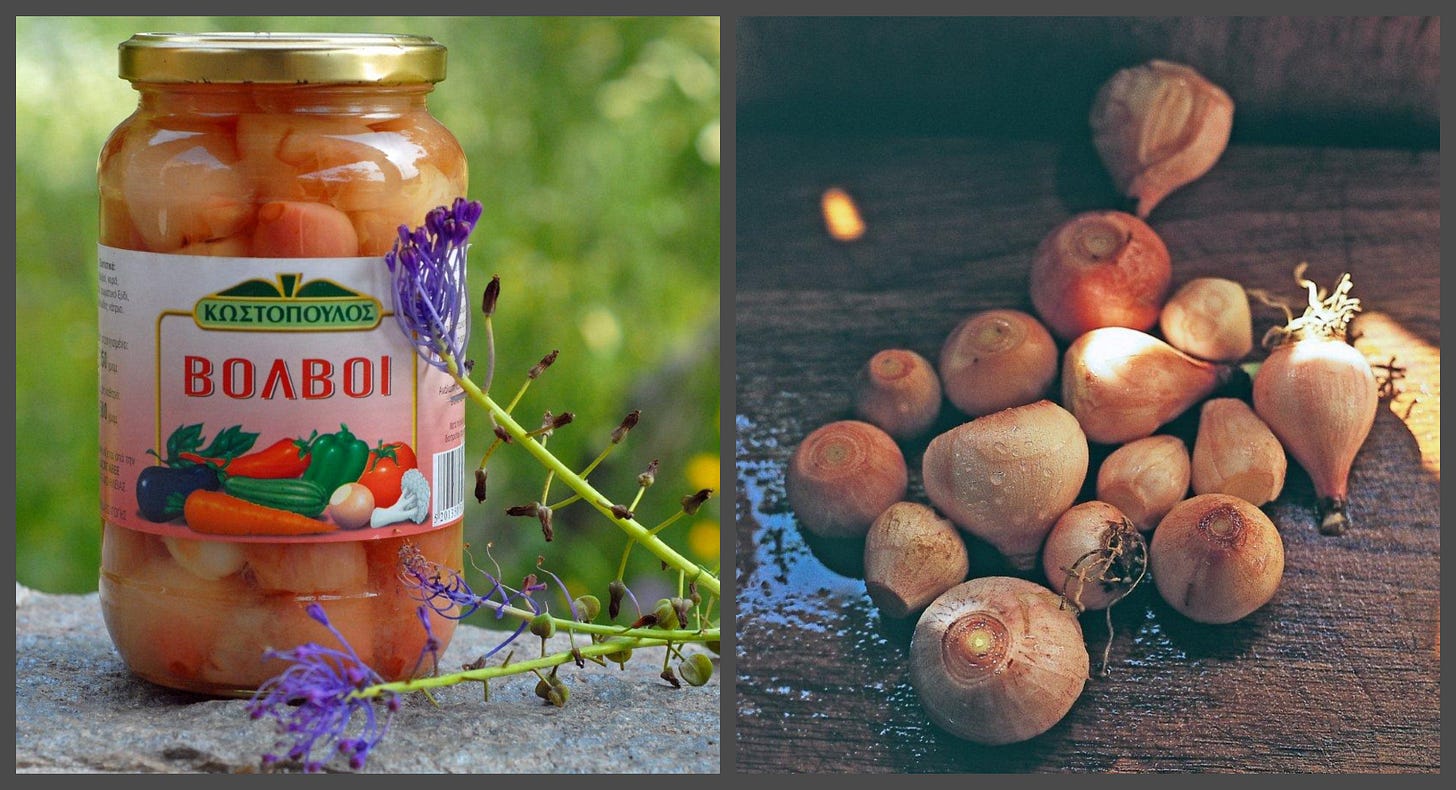A Traditionally Vegan Greek Feast
'Clean Monday' the first day of Lent preceding Easter, echoes the ancient Pagan fertility rituals
Tourists visiting the Acropolis on a February or March Monday morning will certainly be surprised to see the steady flow of locals, young and old, walking in the direction of Philopappou Hill, across from the Parthenon.
Spero Vassiliou (1903-1985): Clean Monday Feast, 1950. Municipality of Rhodes Museum of Modern Greek Art
They all head toward a common destination for an outdoor lunch, carrying not just bags brimming with food, but also large, multi-colored kites. They are the Athenians who like to keep tradition and celebrate Kathari Deftera (Clean Monday) --the first day of the 40-day Lent before Easter-- out of doors.
With Greek Easter celebrated on May 5 this year, Kathari Deftera, on March 18, will hopefully be a pleasant, sunny day.
Adapted from a paper I did for the 2011 Oxford Food Symposium, during which I also organized a Clean Monday lunch, served at the wonderful dining hall of St Catz’s Modernist College.
Spicy Pickled Octopus, served over boiled potatoes, taramosalata and giant beans in tomato sauce, from the 2011 Oxford Symposium lunch.
As is the custom, people gather on this historic hill to eat, drink, fly kites, and dance to the tunes of live bands provided by the city’s municipality.
If the tourists had the chance to look into the bags containing foods for this festive picnic, they would probably assume that Athenians had suddenly become vegans, or that they had decided to dedicate this spring day to the renowned, yet hard-to-find, “Mediterranean Diet.” How else could anybody familiar with Greek customs explain a public celebration that did not involve roasted lamb, kid, or pork?
Kathari Deftera is the equivalent of Ash Wednesday or Shrove Monday. It is tied to Greek Orthodox Easter and thus it is ‘a moveable feast,’ based on the lunar calendar. It resonates clearly with the Roman pagan Februa or Februatio festivals. These involved ritual purifications and were later incorporated with Lupercalia, the ancient, pastoral festival, which included several practices meant to avert evil spirits, purify the city, and more importantly, bring health and fertility.
Kite flying adds an interesting twist to this unusual Greek celebration. Nobody knows exactly when kites became part of Kathari Deftera, but it is almost certain that this flamboyant Asian custom, imported to Europe in the 19th century, was soon transplanted to Greece by cosmopolitan Athenians. I read that in Bermuda, kite-flying is part of the traditional Easter celebrations ‘symbolizing Christ’s ascent.’ I can’t tell you anything about the symbolism of kite-flying during the first day of Lent, but Kathari Deftera is not complete without them. If the wind is favorably light, the sky fills with multicolored kites.
In the old days boys and their fathers would craft kites using local bamboo canes, cotton strings, and multi-colored oilpapers glued together with flour paste. Now, of course, people buy ready-made plastic kites, often hideously displaying the insignia and colors of popular soccer teams.
According to the official Orthodox Church, the Lent actually begins the preceding (Sunday) night at a special service called Forgiveness Vespers. Apokreo is the Greek word for Carnival and much like its Latin counterpart it means ‘to do away with meat’. It is the day women clean their pots and pans, getting rid of all remnants of meat, dairy, and eggs that they cooked in the weeks prior to Carnival. According to a mock wailing song from the Fthiotis region, in Central Greece:
“Clean Monday claims the death of Meat,
Cheese is moribund,
while Mr. Leek raises its tail
and Mr. Onion lifts its beard…”
The official character of Clean Monday is set by the first twenty verses of Isaiah read at the vespers: ‘Wash yourselves, make yourselves clean; remove the evil of your doings from before my eyes; cease to do evil; learn to do good; seek justice, rescue the oppressed, defend the orphan, plead for the widow. Come now, let us argue it out, says the Lord: though your sins are like scarlet, they shall be like snow; though they are red like crimson, they shall become like wool (Is 1:16–8 RSV).”
I can’t help wondering how Isaiah’s prophesy might be stretched to includes the crimson red kites of Olympiakos, the most popular Greek soccer team, whose followers include some feared hooligans…
Fertility Rituals
The popular celebrations of the first day of the forty-day Lent (forty-eight days, in fact) preceding Greek Easter could hardly fit into Isaiah’s dream of sober abstinence and repentance. No wonder the official church has shunned them for years, rightly considering them excesses of pagan origin that sneaked their way into cathartic Christian traditions. To the spite of the official Church, the actual rituals performed during the first meatless day of each year feel more like a continuation of the riotous Carnival festivals that precede this day of supposed sobriety. The copious amount of alcohol consumed during the Clean Monday lunch loosens inhibitions creating wild celebrations, dances, and often daring folk performances that often include cross-dressing and strong sexual connotations. Anthropologists trace the roots of these Dionysian feasts to ancient fertility rituals that marked the beginning of spring, supposedly to stimulate the earth and bring the plants to life after their winter ‘hibernation’.
Among the various playful rituals is the mock Vlach wedding of Thiva, versions of which are also found in various parts of central Greece. This is a ‘wedding’ between two men, one of whom is dressed as the bride, often wearing a bright red veil. They are wedded by a mock priest or monk in a brief ceremony. Then, ‘bride’ and ‘groom’ dance before retiring to their wedding bedroom with their joyous entourage, where they pretend to copulate…
Another explicit fertility celebration is the ‘borani of Tyrnavos,’ perhaps the most daring of all such folk performances. It starts with a maypole dance, something also practiced in Serres and other Macedonian cities. The main Tyrnavos event is the preparation a Lenten soup of nettles and wild greens, called ‘borani.’ Gathered around the big boiling pot, men and women stir the broth reciting evocative poems and singing songs with explicit sexual references, while holding large clay phalluses.
The Foods
To non-Greeks, our Clean Monday table probably sounds like a feast rather than a fast. The rules of Orthodox fasting are somewhat peculiar, although they usually come with interesting explanations. One of the basic principles is that no food containing red blood may be consumed. From this idea stem many unusual, less than obvious prohibitions. For example, although olives are allowed even on Holy Friday, olive oil is not, because in traditional olive pressing the olive pulp was passed between mats woven from goat’s wool(!)
Similarly, only mollusks (octopus, cuttlefish, calamari), crustaceans (shrimp, lobster etc.) and fish roe are permitted; the flesh of fish that has even the smallest traces of red blood is considered ‘meat,’ and therefore unsuitable for the Lenten table. In other words, fish roe, or even caviar are safely ‘clean’ foods, most appropriate for that glorious first day of Lent; and so is wine!
Pickled vegetables, among them the bitter and crunchy volvi (grape hyacinth bulbs, the lampascioni of Puglia), plus freshly cured green and black olives, are eaten with lagana, a flat dimpled bread. Lagana is supposed to be an unleavened bread, but it gradually became a focaccia-like loaf made with ordinary bread dough. Early in the morning, Athenians wait in line outside the bakeries to get a fresh crusty lagana, thus completing their picnic basket before heading towards Philopappou hill, or drive toward the outskirts of the city, to nearby villages and hills.









Wonderful rich details in this post. Thanks Aglaia!
Είσαστε καταπληκτικοί!! Όλα υπέροχα. Φιλία πολλά από τη ΝΥ. Θα είμαι Αθήνα 2-22 Απριλίου.